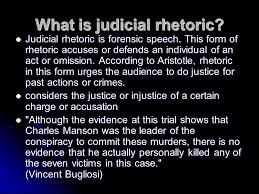
Judicial rhetoric
This essay will be the second major writing assignment of the semester. You will compose a piece of forensic (a.k.a. “judicial”) rhetoric, arguing from evidence that an existing law is either just or unjust.
You must do research, identifying the strongest arguments for or against your chosen law, then offer counterarguments that either persuade you that the law is just or unjust. You should consider this assignment a piece of forensic writing where you can research and uncover the past, the facts, or a truth from actions that have already happened or ideas and laws that have been implemented. **Important – when engaging in forensic rhetoric, be sure to determine your burden of proof. Do not use the strategy of stating facts but instead use your resources to prove your law is just or unjust.
Please remember, although you may want to take on the Supreme Court, it is advised that you pick up an argument closer to home. For example, writing a short paper about the law of the death penalty or abortion would not work for this assignment it is too large of an encumbrance for you to pursue. Also, trying to prove that you want to change the drinking age or legalize marijuana in Texas would again but too broad of a topic to handle. Instead, I would advise that you look up local Texas laws. For example, SB (Senate Bill) 1381 requires Texas businesses to ask for proof of ID with all Credit Card or Debit Card purchases. HB (House Bill) 478 states that a person who, by force or otherwise, enters a motor vehicle for the purpose of removing a vulnerable individual (i.e., child) from the vehicle is immune from civil liability for damages resulting from that entry or removal. HB 590, which took effect on September 1st, 2017, shields first responders who provide roadside assistance in good faith from liability related to their care, so long as they are not negligent, reckless, or commit intentional misconduct. HB 1645, which went into effect immediately, states that if a school district allows high school students to earn a letter for academic, athletic, or extracurricular achievements, the district must allow high school students in the district to earn a letter on the basis of a student’s participation in a Special Olympics event.
For this second essay, I would like you to adopt the academic style that you are probably already familiar with (MLA format). You should not, then, present yourself as a partisan—that is, one who has chosen his/her side of an issue before the fact. Instead, you need to present yourself as a dispassionate observer, critical and careful in your thinking about this issue. In other words, the style is going to be more inclined toward logos and much less toward pathos. Ethos must, as always, also be established, but this is best done subtly and implicitly. There is no place for the pronoun usage of “I” within this essay.
You will need to conduct research for this project and have at least two documented sources for this essay. You will certainly find more evidence for your chosen law than you can include in this short essay; hence, you will need to “sift” through it, selecting the best proofs, the most convincing evidence, for your paper. Do not construct a “strawman” argument (one that is weak, fragile, and thus easily destroyed). Instead, find the strongest evidence out there, and take it seriously in your writing of the paper. If you use websites, try to identify those that are credible. So try very hard to find those sources that present themselves as possessing a strong, trustworthy ethos.
We can write this or a similar paper for you! Simply fill the order form!




